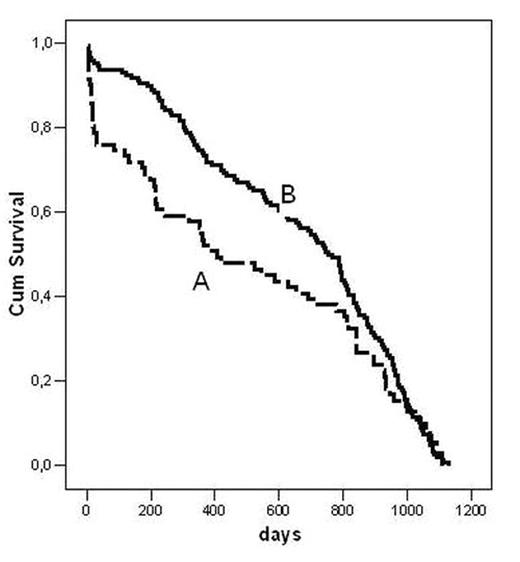Abstract
Previous studies have shown that anemia is frequently associated with higher morbidity and mortality in HF pts. Our aim was to determine the impact of anemia in pts hospitalized with congestive HF at our hospital. We analyzed data from 277 pts with diagnosis of HF admitted between 1 June 2004 and 31 December 2005, with a follow up of at least 6 months. Anemia was defined as hemoglobin (Hb) <11,5 g/dl. HF was classified according to Framingham criteria. Previous history of arterial hypertension, diabetes, dislipemia, chronic renal insufficiency and ACE inhibitors treatment was recorded. Ischaemic and non- ischaemic etiology of cardiopathy was established. Renal disfunction was defined as creatinin concentraction >1.9 mg/dl. Pts with HF were assigned to group A (with anemia) or B (control). Statistical analysis was performed using Pearson’s Chi square, Spearman’s rho, Fisher test and Kaplan Meyer survival function.
Results: We evaluated 229 (82,7%) pts with a median follow up of 594 days (range: 1–1129 days). Mean age was 68,02 years (median 71, range: 17–91). 143/229 (62,4%) were male. In 75 /229 (32.75%) cases a Hb < 11,5 g/dl was measured at admission. The mean Hb was 13,1 g/dl for the entire group. Anemia pts showed a mean Hb of 10.6 g/dl. Demographic, clinical and outcome features are shown in table 1.Group A showed a higher number of readmissions because of HF and other cardiac.
Conclussions: In our analysis the prevalence of anemia was 33% in pts hospitalized for HF. There was no significant differences among clinical variables between anemic and non-anemic pts. Anemia was associated with worse clinical outcome (Group A pts required more readmissions for HF and other cardiological causes)and all cause mortality. Mean survival was longer in Group B pts.according to Kaplan Meyer analysis.
RESULTS
| . | GROUP A (n=75) . | GROUP B (n= 154) . | p . |
|---|---|---|---|
| Male | 42 (56%) | 101 (65.5%) | |
| Mean age (years) | 70.38 (R:20–90) | 67.1 (R:17–91) | |
| Mean Hb (g/dl) | 10.6 | 14.3 | |
| Ischaemic cardiopathy | 38(50,6%) | 78(50.6%) | |
| Non ischaemic cardiopathy | 41(54,6%) | 78 | |
| Arterial hypertension | 54(72%) | 106(68.8%) | |
| Diabetes | 24(32%) | 33(21.4%) | |
| Dislipaemia | 35(46.6%) | 64(41.5%) | |
| Chronic renal insufficiency | 18(24%) | 19(12.3%) | 0.03 |
| Previous ACE inhibitors treatment | 25(33%) | 71(46%) | 0.08 |
| Acute pulmonary edema | 12(16%) | 15(9.7%) | |
| Creatinin concentration > 1.9 mg/dl | 16(21.3%) | 18 (11.6%) | |
| Hospitalization days (mean) | 9.6 (R: 1–51) | 8.1(R:1–59) | |
| Readmission for HF | 37 | 190 | 0.001 |
| Readmission for other cardiologic causes | 20 | 109 | 0.017 |
| Readmission for non cardiologic diseases | 18 | 58 | |
| Mean survival (days) | 499 (R:1–1091) | 658 (r=1–1129) | 0.166 |
| Global mortality | 25 (33%) | 32(21%) | 0.05 |
| HF related mortality | 13 (20.9%) | 24 (14.3%) |
| . | GROUP A (n=75) . | GROUP B (n= 154) . | p . |
|---|---|---|---|
| Male | 42 (56%) | 101 (65.5%) | |
| Mean age (years) | 70.38 (R:20–90) | 67.1 (R:17–91) | |
| Mean Hb (g/dl) | 10.6 | 14.3 | |
| Ischaemic cardiopathy | 38(50,6%) | 78(50.6%) | |
| Non ischaemic cardiopathy | 41(54,6%) | 78 | |
| Arterial hypertension | 54(72%) | 106(68.8%) | |
| Diabetes | 24(32%) | 33(21.4%) | |
| Dislipaemia | 35(46.6%) | 64(41.5%) | |
| Chronic renal insufficiency | 18(24%) | 19(12.3%) | 0.03 |
| Previous ACE inhibitors treatment | 25(33%) | 71(46%) | 0.08 |
| Acute pulmonary edema | 12(16%) | 15(9.7%) | |
| Creatinin concentration > 1.9 mg/dl | 16(21.3%) | 18 (11.6%) | |
| Hospitalization days (mean) | 9.6 (R: 1–51) | 8.1(R:1–59) | |
| Readmission for HF | 37 | 190 | 0.001 |
| Readmission for other cardiologic causes | 20 | 109 | 0.017 |
| Readmission for non cardiologic diseases | 18 | 58 | |
| Mean survival (days) | 499 (R:1–1091) | 658 (r=1–1129) | 0.166 |
| Global mortality | 25 (33%) | 32(21%) | 0.05 |
| HF related mortality | 13 (20.9%) | 24 (14.3%) |
Figure
Author notes
Disclosure: No relevant conflicts of interest to declare.


This feature is available to Subscribers Only
Sign In or Create an Account Close Modal